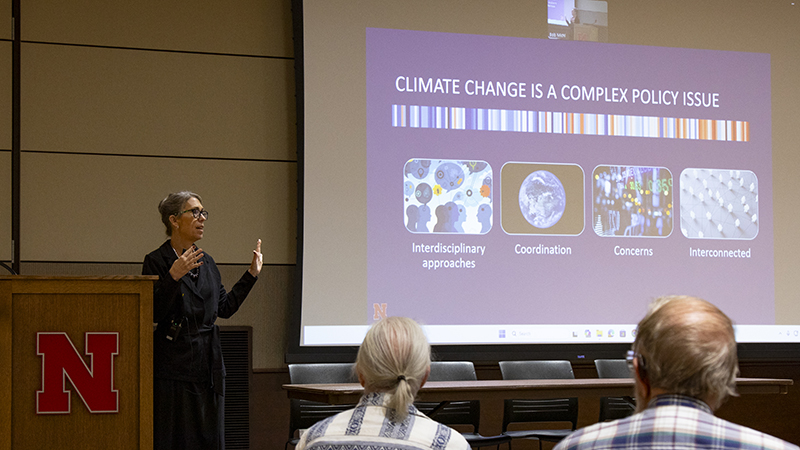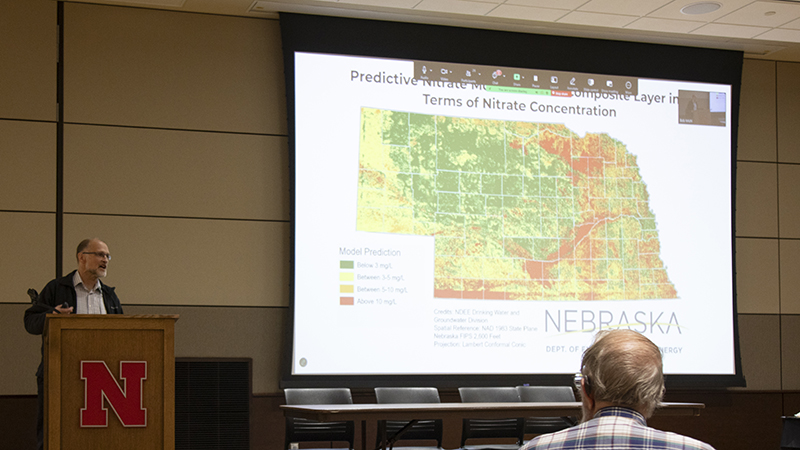Posted: 10/8/2025
Four SNR people present at OLLI symposium on water issues

By Ronica Stromberg
The Osher Lifelong Learning Institute featured four School of Natural Resources people as experts at its 2025 fall symposium in the Nebraska East Union Sept. 27.
With the theme "Global and Regional Water Issues: Challenges and Solutions," the symposium drew 116 attendees to hear from eight speakers about water issues in Nebraska and worldwide.
Deborah Bathke, state climatologist and research associate professor in the School of Natural Resources, spoke about the state climate change report, "Understanding and Assessing Climate Change: Preparing for Nebraska's Future," released September 24, 2025. She said she wanted to communicate through her presentation that climate change isn't just a worry for the future.
"It's happening now," she said. "We can detect that and see that in Nebraska, and we mostly see that through the changes in extremes. So, that whiplash from dry to wet that we've seen, and we also see it in changes in seasonal shifts in the climate."
Her office, the Nebraska State Climate Office, tracks temperature records back to 1895 and has observed rising temperatures and reduced snow cover in the state.
"Nebraska has, overall, become warmer," she said. "Precipitation is maybe a little bit wetter, but you see bigger things at the seasonal level than you do at the annual level."

Daniel Snow, School of Natural Resources research professor, and Katie Cameron, hydrogeologist for the school’s Conservation and Survey Division spoke on a panel about Nebraska water issues with Chittaranjan Ray, director of the Nebraska Water Center; Marty Stange, environmental supervisor for the City of Hastings; and Anthony Schutz, agricultural law professor at the University of Nebraska–Lincoln. Snow directs the Water Sciences Laboratory at the Nebraska Water Center and showcased recent research on water quality issues.
"I think the attendees came away with a greater appreciation of climate and water quality issues the state is facing," he said. "Nebraska is fortunate to have abundant groundwater primarily from the High Plains-Ogallala Aquifer system. Much of this resource lies very close to the surface and is vulnerable to contamination from agricultural activities. Nitrate leached from sandy, heavily irrigated cropland is the most common contaminant, affecting drinking water quality in community and private supplies throughout the state. Extension and outreach efforts, such as the Know Your Well program, help convey this vulnerability to the public and ultimately lead to safer drinking water for all Nebraskans."
Ethan Freese, a producer and photographer in the School of Natural Resources, ended the sessions with a presentation about the Platte Basin Timelapse Project. The project uses time-lapse cameras throughout the Platte Basin to record changes in the watershed over time. The project has more than 5.5 million photographs and produces films and photo stories.
"The main theme of my presentation was just how do we get people in the Platte Basin and other watersheds to develop a deeper understanding and deeper connection to their water and help people realize that their water just doesn't come out of our tap," he said. "It's a long, complicated process that it has to go through to get to us, and there are oftentimes a lot of competing interests for that water. It's a really valuable resource that we need to value and understand where it comes from."
Nebraska is blessed with water resources but has water issues it needs to address, Freese said. The Platte Basin Timelapse's role in addressing those issues is more building awareness, he said.
"I hope we can use our images to spark a conversation and get people to start thinking about it more and maybe seek out those people that are really knowledgeable about the solutions and the problems that we're facing in this area," he said.
Bob Michl, director of the Osher Lifelong Learning Institute and symposium organizer, said the event went incredibly well, attracting about 90% of its attendees from the general public. OLLI is a lifelong learning program for adults 50 years and older. It offers noncredit courses and events and the annual symposium. The symposium cost $20, including lunch, for in-person attendees and $15 for virtual. It went from 9 a.m. to 2:30 p.m.
Michl said Don Wilhite, emeritus of the School of Natural Resources and climatologist and drought mitigation specialist, was a huge help to the symposium planning committee in finding speakers. He expressed gratitude for the speakers taking part.
"There are a lot of people right here at the University of Nebraska who are outstanding resources for us in this particular subject matter," Michl said. "So, we were glad to have them be a part of this."